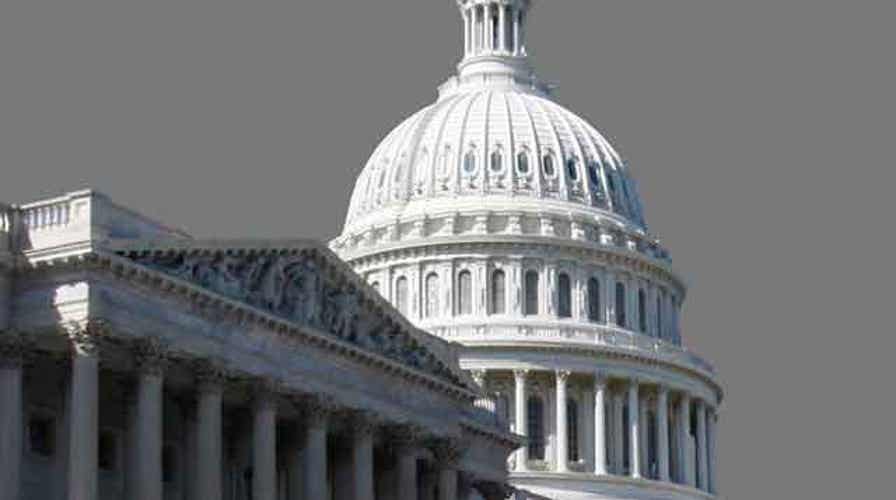How do lawmakers close tax gap as 'fiscal cliff' nears?
Washington goes back to work to try and strike deal
Families across the country might soon have to start trimming back their monthly budgets, with lawmakers running out of time and ideas for averting a crushing set of tax hikes.
President Obama, cutting his family vacation short, flew out of Hawaii late Wednesday and planned to be back in Washington by Thursday morning. But it's not clear what he'll do once he gets there -- as of Wednesday, congressional leaders on all sides reported little to no bipartisan progress, or even conversations, toward a fiscal crisis deal over the Christmas break.
Obama aides and lawmakers are now talking about a scaled-down package as the most likely vehicle for solving the problem, something that could at least prevent most of the scheduled tax hikes.
But without at least a short-term fix, families are going to have to break out the calculators in the new year and figure out how to make do with less.
"You're going to have less money to spend in a very difficult economy with very little clarity on how the economy will pick up in the near future, or even in the long run," financial adviser Ed Butowsky said. "We are entering into a very difficult economic environment, unfortunately."
According to numbers crunched by the Tax Policy Center, millions of families will take a hit, to varying degrees.
For those making below $10,000, the tax increase amounts to roughly $300. But those making between $40,000 and $50,000 would pay an additional $1,700 in 2013.
Up the pay scale a bit more, households earning $50,000-$75,000 would send an extra $2,300 to Washington. And for those making over $200,000 -- but under $500,000 -- the tax bill will grow by roughly $14,000.
The numbers go up from there. Those making more than a million dollars a year could pay more than $200,000 in additional taxes.
There are still some escape hatches on the road to this scenario. Congress and the White House could come together on a scaled-back deal; they could pass a short-term bill extending current rates and resume the debate next year; or they could let the tax hikes take effect, only to come back in 2013 and retroactively patch up the mess.
But to do that, they need a plan. And updates from congressional offices and the White House over the last several days do not bode well.
A spokesman for Senate Majority Leader Harry Reid's office told Fox Business Network on Wednesday that there had been "no conversations with Republicans yet." A spokesman for Senate Republican Leader Mitch McConnell likewise claimed there had been "no outreach from any Dems."
Updates from House leadership were similarly brief.
The members continue to talk among their own parties. The House Republican leadership on Wednesday afternoon convened a conference call to discuss the status of the looming fiscal crisis with rank-and-file members.
Afterward, the leaders released a statement calling on the Senate to make the next move. They noted that the House has already passed two bills to stop all tax hikes and rearrange a raft of spending cuts -- though Senate Democrats oppose them.
"If the Senate will not approve and send them to the president to be signed into law in their current form, they must be amended and returned to the House," the Republican leaders said. "Once this has occurred, the House will then consider whether to accept the bills as amended, or to send them back to the Senate with additional amendments. The House will take this action on whatever the Senate can pass, but the Senate first must act. The lines of communication remain open, and we will continue to work with our colleagues to avert the largest tax hike in American history, and to address the underlying problem, which is spending."
The leaders also reiterated to the rank-and-file that they would give members a 48-hour notice if they need to recall them to Washington.
The only scheduled business for Thursday, though, involves the Senate, which is back in session to deal with an emergency relief bill for Superstorm Sandy and a government surveillance bill.
Obama, before leaving for Hawaii this past Friday, expressed hope that all sides -- against the pressure of a Jan. 1 deadline -- could come together on a deal.
"In the next few days, I've asked leaders of Congress to work towards a package that prevents a tax hike on middle-class Americans, protects unemployment insurance for 2 million Americans, and lays the groundwork for further work on both growth and deficit reduction. That's an achievable goal. That can get done in 10 days," Obama said.
Five days have passed since those remarks. Lawmakers now have five full days before the deadline.
Such congressional action would be historically rare. Neither the House nor Senate has met for legislative action between Christmas and New Year's since December 1970.
On Dec. 31 of that year, the House met to approve a budget bill preventing a partial government shutdown. The Senate approved it a few days later.
Fox News' Molly Henneberg contributed to this report.





